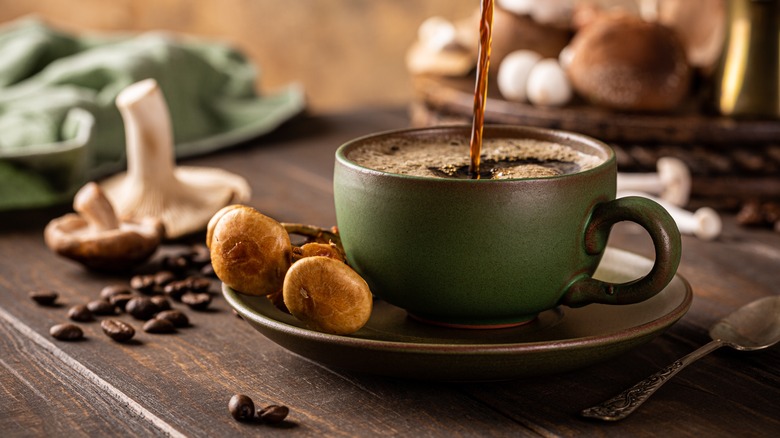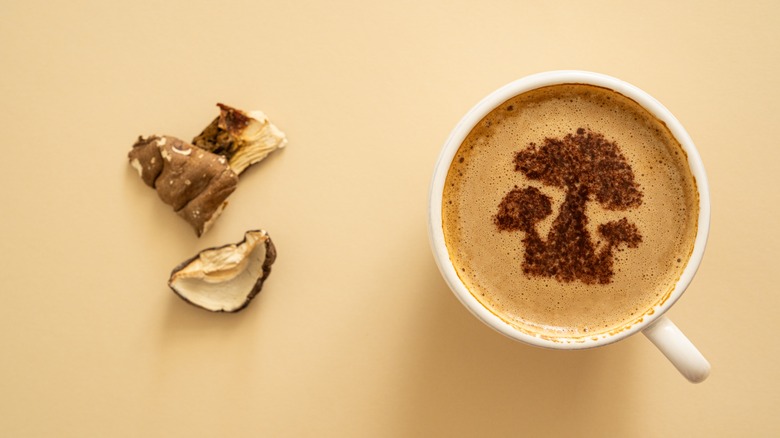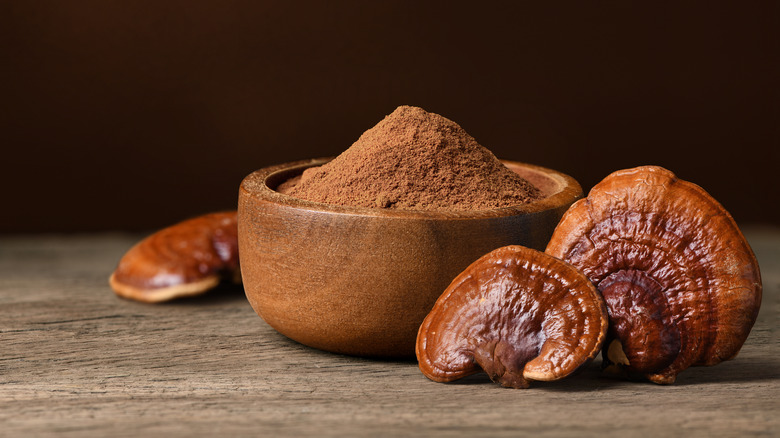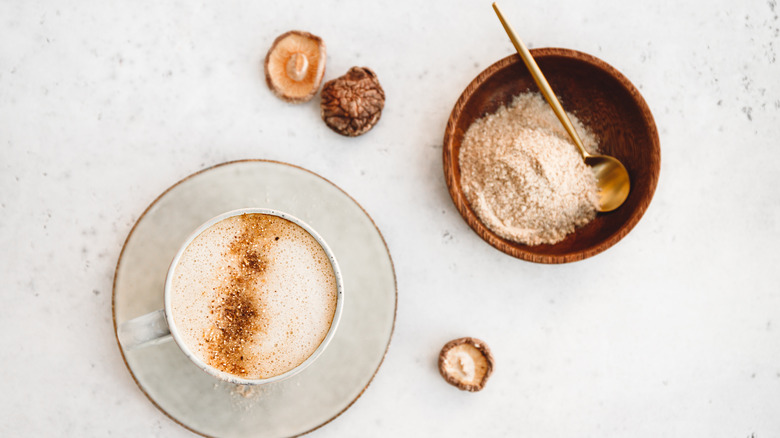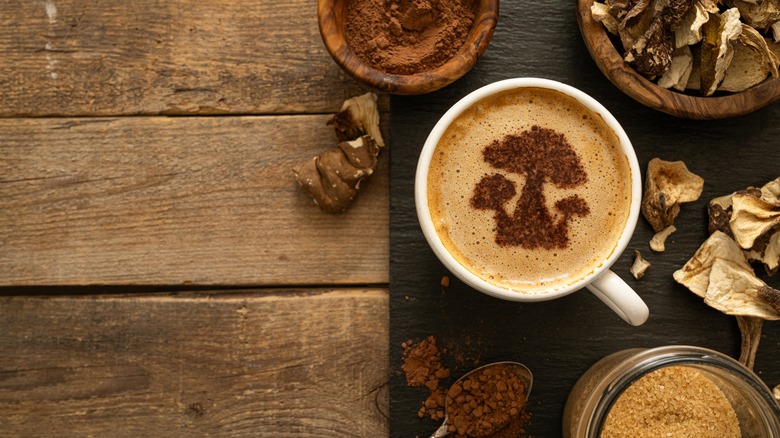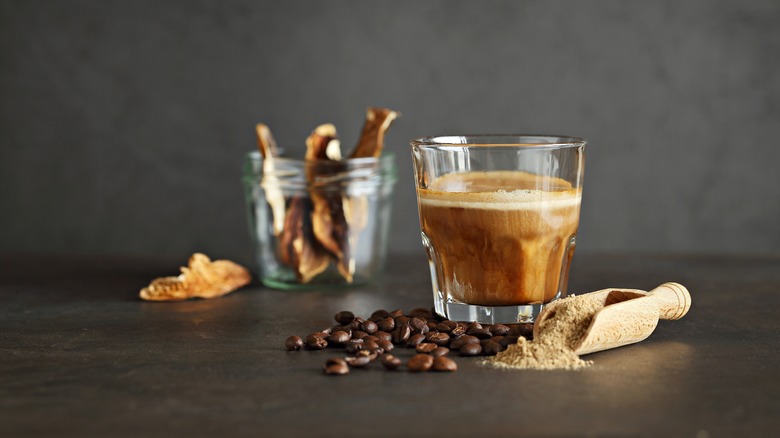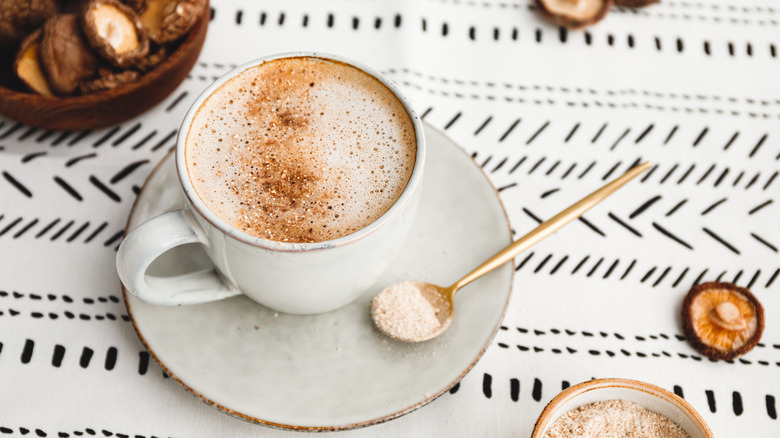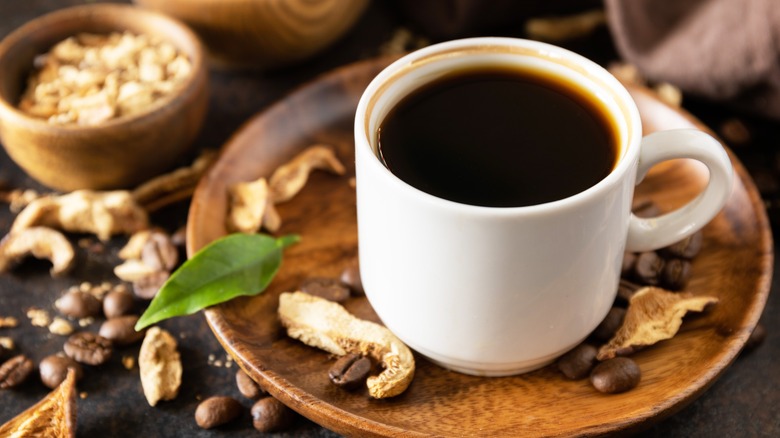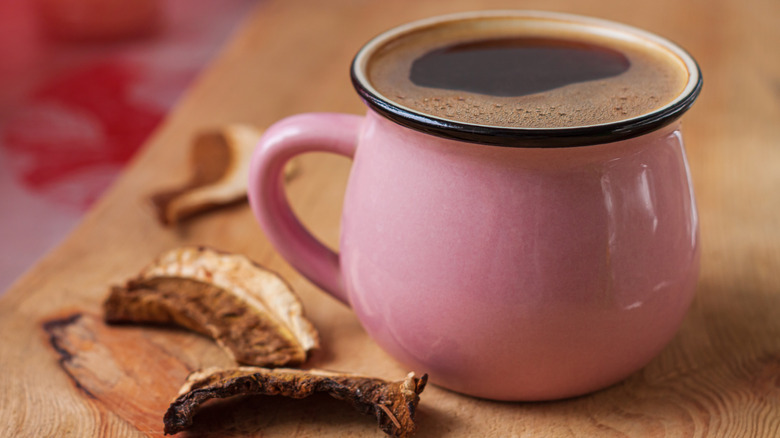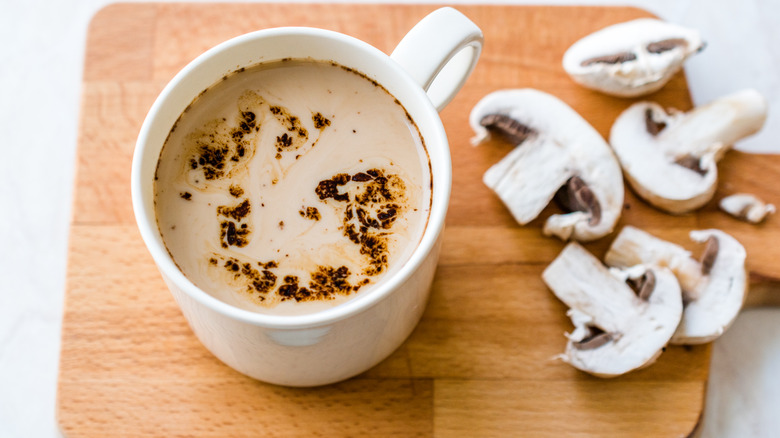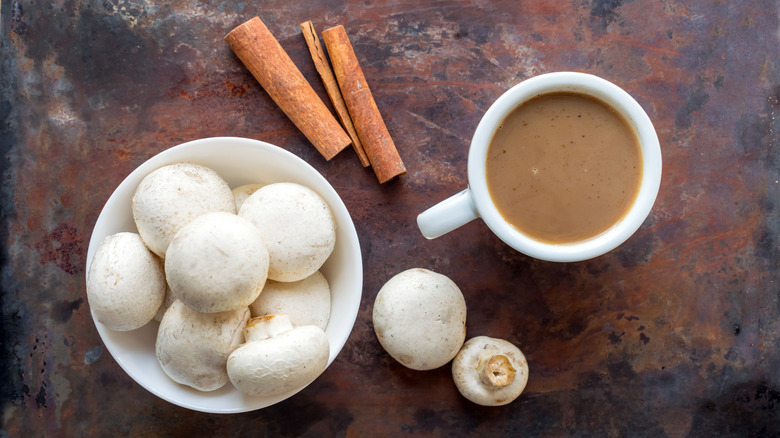What Is Mushroom Coffee, And Should You Drink It?
It's hard to believe a combination as unlikely as coffee and mushrooms could become a major trend – how would that even work and why would anyone want to consume them together? But somehow, mushroom coffee has won over the internet, not to mention crowds of health-conscious (and just curious) coffee lovers. And if you haven't yet tried it, you'll be relieved to know it's not just a cup of coffee with sliced mushrooms in it — if you try a cup of mushroom coffee, not only will you not see any trace of mushroom, there's a good chance you won't even taste them.
This is all by design: The mushrooms in mushroom coffee aren't there to contribute their flavor, but their nutritional benefits. The drink was designed to take advantage of the growing popularity of functional foods, and specifically the growing public awareness of the nutritional benefits of mushrooms traditionally used in East Asian medicine, such as lion's mane and cordyceps (via Gin Sen) And because the earthy, bitter taste of coffee harmonizes with (or at least covers up) the earthy taste of these mushrooms, the drink is marketed as a way for coffee lovers to get more nutritional bang for their buck — and for many fans, it's become a standard part of their morning routine.
What is mushroom coffee?
Mushroom coffee is exactly as advertised — a combination of coffee and dried, powdered mushrooms. It comes in both instant and ground, ready-to-brew forms, which are meant to be prepared and served just like regular coffee. And the mushrooms are more than a decorative add-an — most mushroom coffee varieties contain equal parts of mushrooms and coffee.
While the idea of mushrooms in a beverage may seem strange, it's not entirely new. Mushrooms are valued in traditional Chinese medicine for their therapeutic properties, and brewing them into tea is among the ways they are administered (via the International Journal of Medicinal Mushrooms). As Western consumers became increasingly interested in the potential health benefits of certain mushrooms, a range of mushroom-based consumables – from supplements to nut milks to energy drinks – began to emerge, with mushroom coffee drawing a lion's share of the buzz.
How is mushroom coffee made?
When you open a package of mushroom coffee, you won't see any mushrooms — they've been ground so fine they're no longer recognizable. Commercial producers first dry the mushrooms and grind them into a powder before mixing them into the coffee, which may be already roasted and ground or in whole bean form (some producers roast their coffee beans and mushroom powder together before grinding).
If you enjoy mushroom coffee but not the high prices it commands (or if you want more control over the flavor and composition of your mushroom coffee), it's also easy to make at home. An especially quick route is to use premade dried mushroom powder, but if you're feeling ambitious, you can dry and grind the mushrooms yourself. When you're ready for a cup of coffee, mix equal amounts of mushroom powder and ground coffee and brew as usual. If you use whole coffee beans and grind them just before brewing, store them separately from your mushroom powder, and combine them only when you're ready to brew.
Mushroom coffee vs regular coffee
While most mushroom coffee contains equal proportions of mushrooms and coffee, it looks and drinks pretty much like regular coffee – you can even find mushroom coffee in pod form. One significant difference coffee fans will notice, however, is that because it's only half coffee, each cup will have half as much caffeine as a cup of regular coffee. If you're trying to cut down on caffeine and lead a calmer lifestyle, this can be a plus — but not so much if you cherish your morning coffee buzz.
The other major difference you'll notice between mushroom coffee and regular coffee is its price tag – mushroom coffee is typically twice as expensive, in large part because of the relative scarcity of the medicinal mushrooms it features. You can cut down much of that cost by buying powdered mushrooms and making your own, or by saving your mushroom coffee for a weekend treat.
What does mushroom coffee taste like?
If you've been hesitating to try mushroom coffee because you're worried about how it might taste, you're in for a pleasant surprise — mushroom coffee has little if any mushroom flavor. Indeed, some tasters detected no difference from plain coffee at all. "My sister drinks mushroom coffee and one time I stayed with her for a week and was drinking it every morning without realizing, it doesn't taste that different at all," a Reddit commenter reported.
Other tasters, however, did notice a difference, with one calling it, "A little earthier tasting than regular coffee." Another noted a distinct difference: "It does taste weird, it does not taste like coffee lol, like you know how most Slim Fast drinks can taste a bit funny? Just like any health drink would taste, that's what you can expect from mushroom coffee ..." And a review of one of the varieties offered by the popular Four Sigmatic brand noted that while there was no distinct mushroom flavor, it was "a little more bitter than I'm used to," a feature the reviewer attributed to the added mushrooms.
Where to buy mushroom coffee
If you're curious to try mushroom coffee, the good news is you won't have to look too hard to find it. While it started as a niche product and was primarily available online, it's now become so popular that mainstream retailers including Target and Wal-Mart carry it. And if you're among the many who find coffee more fun to drink if someone else is making it, a number of coffeehouses offer mushroom coffee, sometimes multiple varieties.
But mushroom coffee, like all products, varies widely across brands, with some manufacturers using better-quality ingredients than others, so it's a good idea to read the ingredient list before you buy. Something to look for are drinks that call themselves mushroom coffee (or similar) but don't contain any coffee – caffeine-free mushroom drinks have become popular in their own right, but if you're looking for a mushroom cuppa joe, they'll be a disappointment.
Mushroom coffee offers extra nutrients
Okay, so mushroom coffee is twice as pricy as normal coffee and is tastes strange to some people. But crowds continue to clamor for it because of its purported health benefits. The mushrooms used in the coffee are those long valued for their therapeutic value in traditional Chinese medicine and used to control blood pressure and support the immune system, among other functions (via WebMD).
Modern coffee drinkers seek out mushroom coffee for many of the same reasons. The mushrooms contain adaptogens, compounds that help the body adapt to and combat stress (per UCLA Health). In addition, they contain polyphenols as well as a range of other antioxidants, all of which can potentially reduce inflammation and boost the immune system. It's worth noting, however, that it's unclear how many of these beneficial compounds are preserved in the drying and extraction process used to make mushroom coffee. And while some fans claim that mushroom coffee allows them to stay alert without getting jittery and nervous, the stress-relieving properties of mushroom coffee have yet to be scientifically proven.
Mushroom coffee is easy to store
While fresh mushrooms are highly perishable – they can last refrigerated for up to two weeks, provided they're kept dry and stored in a porous container –dried, powdered mushrooms in mushroom coffee don't impose any special storage requirements on the drink. Thus, mushroom coffee can be stored in the same way as any other coffee. Many varieties of mushroom coffee come in instant or pod form, and are just as low maintenance as regular instant coffee and coffee pods – just keep them in their original containers at room temperature and away from moisture.
Ground coffee varieties should also be kept tightly sealed in their original containers and away from direct light. There's no need to refrigerate ground mushroom coffee (or any ground coffee, for that matter) – the refrigerator can expose the coffee to harmful moisture and cause it to absorb unwanted odors from nearby items. While both the dried mushrooms and coffee have long shelf lives, they can lose their flavor over time — so plan on drinking up your stash within a few months.
Here are some popular mushroom coffee brands
Since mushroom coffee first hit the scene, numerous producers have eagerly embraced the trend, some making multiple varieties in different flavors with different mushrooms. What all have in common, however, is an emphasis on the health benefits of their products. And the best producers don't cut corners in their efforts to deliver a healthful product — many use only organic ingredients (per The Manual).
No discussion of mushroom coffee brands would be complete without mentioning Four Sigmatic, the Finnish company that first introduced mushroom coffee and launched the craze. Their coffee comes in the form of individual sachets of instant coffee, and reviewers praised it for its chocolaty taste. Ryze is another popular brand, and takes its mission to improve health and mental wellbeing seriously — the company even offers its customers its own mindfulness app. If you prefer brewed coffee to instant, Laird Superfood's Focus coffee is a popular choice. And if you're a latte lover, you can get your creamy sweetness and your mushrooms too with Clevr's Coffee Superlattes, which come in a range of flavors.
How safe is mushroom coffee?
Fans of mushroom coffee claim it offers a number of life-enhancing benefits, such as improved focus and mental clarity, a strengthened immune system, reduced stress and anxiety, and improved cardiovascular health (per Health). And these claims will certainly lead cynics to ask, "What's the catch? Is mushroom coffee really as safe and beneficial as it's claimed to be?"
While not all of the purported health benefits of mushroom coffee have been scientifically confirmed, the good news is it poses few if any risks for most people. If anything, the fact that it has half the caffeine as regular coffee (due to the fact that it's half mushrooms), makes it a safer option for those who need to watch their caffeine consumption, such as the elderly, pregnant women, and those experiencing insomnia. But it still holds risks for some coffee drinkers. Some of the mushrooms used in mushroom coffee can be difficult to digest, which can cause discomfort for those who have pre-existing kidney or digestive disorders (via UCLA Health). Chaga mushrooms, which often appear in mushroom coffee, contain a high proportion of oxalates, which can cause kidney stones if consumed in excess (per Johns Hopkins Medicine). And if you have a mushroom allergy, mushroom coffee is an obvious no-go.
What kind of mushrooms are in mushroom coffee?
Not just any mushroom can go into mushroom coffee – but a surprisingly large range of mushrooms, each with its own reputed health or medicinal benefits, can appear, depending on the brand and variety of coffee you buy. Among these is the familiar shiitake mushroom, traditionally used in Eastern medicine to support metabolic and immune system function (via Ryze Super Foods). Turkey tail, a striped, flat mushroom, is said to have antimicrobial properties and aid in digestive health (per Medical News Today). The lion's mane mushroom, which as its name suggests, is large and shaggy in appearance, is included in some mushroom coffees to improve focus and mental function (via Healthline).
Reishi, which makes frequent appearances in mushroom coffee, is thought to improve mood and relieve anxiety (per MD Bio Wellness). While some mushroom coffees feature an assortment of different mushrooms to provide a host of benefits, others feature just one or two mushroom types with the aim of offering their specific health benefits.
Mushroom coffee has older roots than you think
From watching TikTok, it's easy to believe that mushroom coffee is a completely new thing, a revolutionary rethink of an old favorite beverage. But in reality, it's a drink with deep roots. Certain mushrooms have long been used as medicine: For instance, the first written record on the benefits of reishi mushrooms, a type that often appears in mushroom coffee, dates to 200 AD.
Mushroom coffee as we know it today, however, has its roots in World War II(via the Chicago Tribune). In Finland, as in many other parts of the world, coffee was hard to come by during the war, so enterprising cooks took to soaking and pressing wild chaga mushrooms as a substitute. Their dark color made the steeped chaga extract at least look like coffee. And it was this long-forgotten drink — and a surge of public interest in medicinal mushrooms – that inspired Finnish entrepreneur Tero Isokauppila to incorporate chaga mushrooms into coffee, founding the well-known mushroom coffee brand Four Sigmatic.

